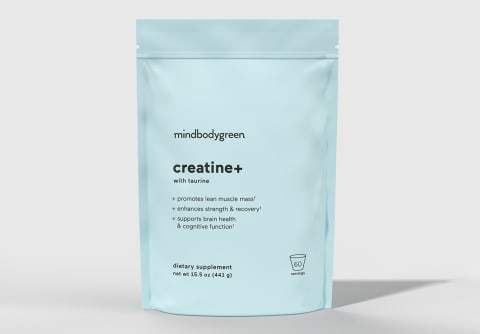Advertisement
Why Creatine Might Make You Gain Weight Temporarily & What To Do

While it was once relegated to bodybuilders and gym enthusiasts, creatine is a well-studied supplement used to build lean body mass and improve athletic performance. That said, the compound does come with a unique side effect: It can increase the amount of water in your body, which can lead to temporary weight gain.
Seeing the number on the scale creep up when you start a new supplement can be confusing. Here's what you need to know about creatine-induced weight gain, including why it happens, how long it lasts, and whether or not you should be concerned about it.
The need-to-knows:
- Creatine can cause temporary weight gain: Some people may experience a small and temporary increase in weight during the first few days of taking creatine.
- This isn't cause for concern: This weight gain is due to how creatine affects water storage in the muscles. It's water weight, not fat, and it will go away in a few days.
- Taking a lower dose of creatine can reduce your risk of weight gain: Still, if you're concerned about gaining weight with a new creatine supplement, stick to modest doses (3-5 grams daily) instead of a higher "loading dose."
What is creatine used for?
Creatine is naturally produced1 in your body from the amino acids arginine, glycine, and methionine. The creatine you produce naturally covers around 50% of your daily creatine needs—the rest must be met through diet, by consuming creatine-rich foods like meat and fish, or by taking creatine supplements.
In the body, creatine phosphate or phosphocreatine is used as a source of energy2 for the contraction of muscles. Supplementing with creatine can therefore increase the level of creatine in muscle cells, which can help enhance athletic performance, improve strength, and encourage muscle growth.* This is why creatine supplements are so popular among athletes and people who want to improve their body composition.
Supplementing with creatine may also combat age-related muscle loss3 in women, and it may be especially helpful for postmenopausal females4.*
Though their most popular use is in supporting athletic performance and increasing strength and muscle mass, creatine supplements have also been shown to5 benefit blood sugar control and improve certain aspects of brain health, such as memory, attention, and mood.*
Summary
Does creatine make you gain weight?
Yes, when taking creatine, you might experience a very small increase in body weight.
"Some people, but not all, experience a small amount of weight gain when taking creatine," Grant Tinsley, Ph.D., a professor and researcher at Texas Tech University, tells mindbodygreen.
However, Tinsley explains that this weight gain is due to water storage, not fat gain.
The small amount of weight that some people experience when taking creatine is typically due to increased creatine concentrations and water storage in the muscles. "While this effect has been observed in multiple studies, not all individuals or groups experience this," he reiterates.
Studies have shown mixed results when it comes to water weight gain and creatine use6. Some studies have found that during the first few days of creatine supplementation, some people experience increases in total body water (TBW), extracellular body water (ECW), and intracellular water (ICW).
For example, a 2017 study published in Medicine & Science in Sports & Exercise that included 18 male cyclists found that when the participants followed a creatine-loading phase that involved taking 20 grams of creatine per day for five days, their TBW increased by 1.4%. 7But, other studies6 have found that creatine has no significant impact on the body's water levels, especially over the long term.
In addition to water weight, creatine can help support muscle mass gain8 when combined with resistance exercise and proper nutrition.* Gaining muscle mass can impact your body weight, but this is usually viewed as a positive side effect of creatine supplementation and is the reason many people use creatine.
Summary
How much weight gain can it cause?
Even though research suggests that some people, especially those using loading doses of creatine (more on this below), might experience a small amount of water weight gain, it's temporary and shouldn't be a cause for concern.
Studies suggest that the amount of weight gained during the first few days of taking creatine is usually only a few pounds.
Also, it seems that this side effect is more common9 when larger doses of creatine are taken, such as in a "loading phase" approach. Men also seem to be more susceptible4 to gaining water weight when taking creatine than women.
Summary
How long does it last?
If you do gain water weight while taking creatine, don't stress. This weight gain is temporary, usually only lasting a few days.
As mentioned above, in studies, this water weight gain was usually seen within the first few days10 of taking a loading dose of creatine.
You shouldn't be worried about long-term weight gain from creatine. Studies show that while creatine can be effective for promoting muscle mass gain, supplementing with creatine can help you lose body fat over time11.
A 2019 review of 19 studies published in the Journal of Functional Morphology and Kinesiology found that older adults who supplemented with creatine12 and participated in resistance training lost more body fat than those taking placebos during their training regimens.
Summary
Best practices for using creatine
If you're concerned about short-term weight gain from creatine, here are some helpful tips for reducing the chance of this side effect:
- Keep your dose low: While it was once thought that taking high doses of creatine before transitioning to a lower maintenance dose was more effective for increasing creatine stores in the muscle, studies show6 that regimens using creatine in doses of 3 grams per day for 28 days are just as effective as regimens using higher doses of 20 grams per day for six days. Another benefit of taking smaller doses of creatine daily is that they are less likely6 to cause side effects like water retention and loose stool.
- Combine creatine with resistance training: Research shows that combining creatine supplements with resistance training is an effective way to increase muscle mass and decrease body fat12. Most studies have used two- to three-day-per-week resistance training regimens.
- Choose creatine monohydrate: Although there are other forms of supplemental creatine available, creatine monohydrate6 is widely considered the most effective and well-researched.
- Take it every day: The goal of taking creatine is to increase the amount of creatine in your muscles, so, as long as you're taking the supplement daily, it should help you reach your body composition goals. Your timing doesn't matter as much, though some studies show13 that taking creatine closer to your workouts (right before or right after) may be more effective for improving performance and increasing muscle mass than taking it further apart from your training sessions.
Arguments against loading dose
It used to be thought that taking a large "loading dose" of creatine for a short period of time was the most effective way to increase skeletal muscle creatine stores.
Creatine loading involves taking high doses of creatine, usually between 20 and 25 grams per day, for five to seven days followed by a "maintenance" dose, usually ranging from 3-5 grams of creatine per day.
However, recent research shows that this protocol isn't totally necessary for everyone, and it's more likely to cause water weight gain as well as side effects like loose stool. In fact, creatine accumulation in muscle cells seems to be similar6 when comparing maintenance regimens of 3 to 5 grams per day for 28 days with higher doses of 20 grams per day for six days.
"A loading phase helps you increase muscle creatine concentrations more quickly, but if you are taking an appropriate maintenance dose of creatine, you will end up in the same place," explains Tinsley.
Summary
The mindbodygreen POV
There's a solid body of research to show that taking a creatine supplement can help enhance muscular strength, endurance, and recovery14, as well as provide benefits for mood1 and brain function15. It may be particularly helpful for women who are looking to maintain or build strength as they age4.*
If you're starting to take creatine for the first time, you may notice that it causes you to gain a few (less than 5) pounds. This is water weight gain, and it's nothing to worry about—your weight will return to baseline within a few days. Skipping the loading dose phase and taking a more modest 3-5 grams of creatine daily from the beginning will reduce your likelihood of bloat and weight gain.
If you're consuming creatine in the hopes of losing fat or building muscle, you'll want to take the supplement daily and pair it with a resistance exercise program and plenty of protein with adequate leucine.
—Emma Loewe, mindbodygreen's Health & Sustainability Director
Creatine side effects
Creatine supplements aren't associated with much risk other than the potential for side effects like a small amount of water weight gain and stomach issues, like diarrhea, when taken in high doses.
"While individuals with specific medical considerations may wish to consult a medical professional before taking creatine, creatine generally has an excellent safety record," says Tinsley.
Although preliminary evidence16 suggests that taking creatine may be safe for pregnant17 and breastfeeding women, if you're pregnant or breastfeeding, you should always clear supplements with your doctor to ensure they're safe and appropriate for your specific needs.
FAQ
Does creatine make you gain belly weight?
No, creatine will not make you gain weight in your midsection. Even though some people may gain a small amount of water weight during the first few days of taking creatine, studies show that creatine supplements actually help promote fat loss when combined with resistance training.
Does creatine make you gain weight if you don't work out?
No, creatine will not make you gain weight if you don’t work out. However, creatine is most effective for improving body composition when combined with resistance training.
Does creatine make you bloated?
Creatine can lead to a small amount of water weight gain in some people, which may cause you to feel slightly bloated. However, this side effect is temporary and doesn't happen to everyone.
The takeaway
While creatine is effective and has a strong safety record, some people may experience a small and temporary increase in water weight during the first few days of taking it. This isn't a cause for concern, but choosing smaller doses (3-5 grams) of creatine over larger loading doses can help reduce your chances of gaining water weight or having stomach issues. Over time, the supplement should help you reach your body composition goals—as long as you pair it with a healthy, muscle-minded lifestyle.
17 Sources
- https://www.ncbi.nlm.nih.gov/pmc/articles/PMC7910963/
- https://www.ncbi.nlm.nih.gov/pmc/articles/PMC5753968/
- https://pubmed.ncbi.nlm.nih.gov/33557850/
- https://www.ncbi.nlm.nih.gov/pmc/articles/PMC7998865/
- https://www.ncbi.nlm.nih.gov/pmc/articles/PMC7910963
- https://www.ncbi.nlm.nih.gov/pmc/articles/PMC7871530/
- https://pubmed.ncbi.nlm.nih.gov/28410328/
- https://www.ncbi.nlm.nih.gov/pmc/articles/PMC10180745
- https://www.ncbi.nlm.nih.gov/pmc/articles/PMC5296953/
- https://www.ncbi.nlm.nih.gov/pmc/articles/PMC5545206/
- https://pubmed.ncbi.nlm.nih.gov/10731009/
- https://pubmed.ncbi.nlm.nih.gov/33467377/
- https://pubmed.ncbi.nlm.nih.gov/17095924/
- https://www.ncbi.nlm.nih.gov/pmc/articles/PMC5469049/
- https://pubmed.ncbi.nlm.nih.gov/35984306/
- https://pubmed.ncbi.nlm.nih.gov/30000913/
- https://pubmed.ncbi.nlm.nih.gov/31877396/
Watch Next
Enjoy some of our favorite clips from classes
Enjoy some of our favorite clips from classes
What Is Meditation?
Mindfulness/Spirituality | Light Watkins
Box Breathing
Mindfulness/Spirituality | Gwen Dittmar
What Breathwork Can Address
Mindfulness/Spirituality | Gwen Dittmar
The 8 Limbs of Yoga - What is Asana?
Yoga | Caley Alyssa
Two Standing Postures to Open Up Tight Hips
Yoga | Caley Alyssa
How Plants Can Optimize Athletic Performance
Nutrition | Rich Roll
What to Eat Before a Workout
Nutrition | Rich Roll
How Ayurveda Helps Us Navigate Modern Life
Nutrition | Sahara Rose
Messages About Love & Relationships
Love & Relationships | Esther Perel
Love Languages
Love & Relationships | Esther Perel
What Is Meditation?
Box Breathing
What Breathwork Can Address
The 8 Limbs of Yoga - What is Asana?
Two Standing Postures to Open Up Tight Hips
How Plants Can Optimize Athletic Performance
What to Eat Before a Workout
How Ayurveda Helps Us Navigate Modern Life
Messages About Love & Relationships
Love Languages
Advertisement

This Little-Known Supplement Helps Women Sleep & Decreases Signs Of Depression
Molly Knudsen, M.S., RDN

This Little-Known Supplement Helps Women Sleep & Decreases Signs Of Depression
Molly Knudsen, M.S., RDN
















